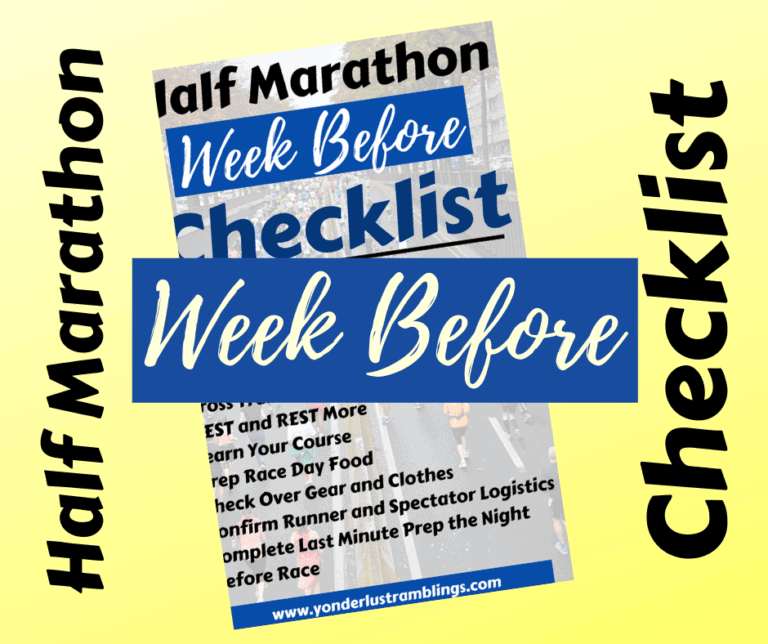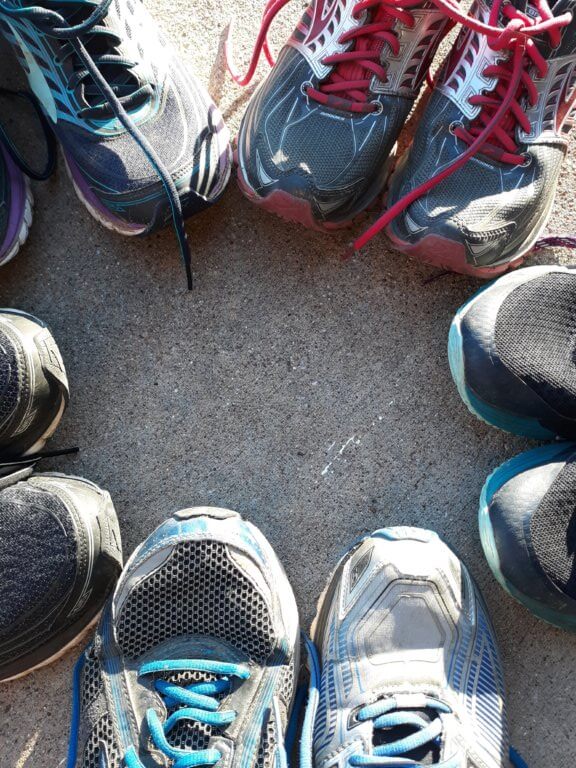11 Morning of Marathon Tips and Checklist
You’ve put in the work and you’ve pushed through the training runs, and now it is finally the morning of your marathon race! It’s perfectly normal to feel a combination of anxiety and excitement, but it is also common to feel like you are going to forget something. Give yourself one less thing to remember on race day with this easy morning of marathon tips and checklist!
Disclosure: Below are some affiliate links-these are all products I highly recommend. I won’t make any recommendations on this page that I haven’t tested or personally used for my own marathon training plan! Enjoy these 11 morning of marathon tips!
Table of Contents
11 Morning of Marathon Tips and Checklist
Follow these 11 morning of marathon tips and checklist to make sure you don’t forget a thing! Here’s a quick “cheat sheet” to get started, but keep reading to learn more about why each of these morning of marathon tips are important!
- #1: WAKE UP EARLY – give yourself at least an hour to get ready, and plan to arrive at least an hour before the start. Build in drive time, time to eat, etc. (your main breakfast meal should be eaten about 2 hours before the start), and you’re probably looking at waking up several hours before the start, depending on how far you have to go to get to the race location.
- #2: EAT A GOOD BREAKFAST – think easily digestible, healthy carbs. Foods you know have worked well in the past, and nothing new!
- #3: CHECK THE WEATHER – make clothing and accessory adjustments as necessary (have these back up plans in place prior to the morning of the marathon).
- #4: GET DRESSED
- #5: CHECK YOUR GEAR – one final “integrity” check of all your gear and accessories to make sure everything is operational and good to go
- #6: PACK SNACKS
- #7: KNOW YOUR LOGISTICS – parking, fees, bathroom setup, bag drop off, starting corrals, spectators, aid stations, course route, elevation profile, post race festivities, etc. You can find a list of common logistical questions to know the answers to below.
- #8: HYDRATE – consistently leading up to the race. No chugging right before, and don’t overdo it.
- #9: WARM UP – how much depends on your experience and goals. Keep yourself warm and avoid sitting or standing still right before the start. Don’t over exert yourself.
- #10: USE THE RESTROOM
- #11: VISUALIZE YOUR RACE – helps calm your mind and nerves
Here’s more about the “WHY” to this checklist! Take a deeper dive into these 11 morning of marathon tips to be fully prepared and as ready as you can possibly be!
#1: Wake Up Early and Give Yourself Enough Time
This means setting your alarm the night before and giving yourself at least a full hour to get ready, even though most experts recommend being awake for at least 2 – 3 hours before your race to be fully primed. It is also recommended to eat your main breakfast meal at least 2 hours before the start of your race, to be fully digested.
It is also a good idea to give yourself an hour at the race location before starting your marathon, to make sure you have time to pick up your packet and bib if necessary, stretch, hydrate, snack if necessary, and go to the bathroom.
It should be easy to start seeing now why you need to wake up early, because you are looking at a couple hours out before the start of your race just to give yourself enough time to wake up, get ready, get your food digested, etc.
If possible, have your clothes, gear, and non perishable breakfast foods laid out the previous night, before you go to bed. This will give you more time and keep you less rushed in the morning.
Give yourself enough time to prepare the SAME WAY YOU DID DURING YOUR MARATHON TRAINING. Don’t make the mistake of mixing things up the morning of your marathon.
If you like to wake up and drink a cup of coffee before running, give yourself time to do that. If you are fine scarfing breakfast down in the car on the drive in because that’s what you always do, then you can plan on that, if the drive is longer (try to eat your main breakfast meal at least 2 hours before the start). I personally would give yourself enough time for all personal needs before leaving for your marathon, but overall, do what you know works for you BASED ON YOUR PRIOR MARATHON TRAINING.
It is great if you can pick up your race packet, bib, and timing chip before the morning of your marathon, as that is one less thing you will have to worry about doing. But if not, make sure to build in enough time upon arrival to do that. For larger races, the packet pickup lines might be longer on the morning of the marathon. You also need to build in enough time to attach your bib and timing chip before the race.
#2: Eat a Healthy, Energy Loaded, Carby Breakfast
Think healthy, easily digestible, breakfast carbs. Some of my personal favorites?
- Oatmeal with peanut butter mixed in
- English muffin with peanut butter
- Whole grain toast with a fried egg
- Sweet potato hash browns.
- Apple slices with peanut butter
- Applesauce with cinnamon
- Bananas
To drink caffeine or not to drink caffeine? That is a big question for many runners on marathon morning. Research has found that runners that prefer caffeine before a race tend to perform better, but there is a catch. Overdoing it can cause digestion issues or jitteriness.
Basically, do what has worked for you DURING your marathon training plan. Drink the type and amount of caffeine that worked for you on your practice runs. Nothing more, nothing different.
#3: Check the Weather
You should be doing this frequently in the days leading up to your marathon race, but do one final check the morning of your marathon. This can help you determine any last minute wardrobe adjustments you may need to make, before you actually have to get dressed.
#4: Get Dressed
Hopefully you laid out all your clothes the night before the morning of your marathon. Make sure to wear the clothes and layers you have used in training. Depending on the weather, you may want to wear light layers. On cold weather race mornings, it is important to minimize shivering in order to conserve energy. That means you may want to wear your layers right up until the start of your race. Some runners even buy specific “throw away layers” that they simply strip off and don’t mind tossing, if they know they are going to be in their starting corral for a while before the start, or too far from their vehicle to make a trip.
If you picked up your race packet and bib early, you can choose to put on your bib now, or wait until you arrive if you know you may be wearing layers up until the start. If you are picking up your race packet on marathon morning, make sure to give yourself enough time built in to do that upon arrival.
#5: Check Your Gear and Accessories
Make sure your water transportation system is good to go. Check over shoelaces, earbuds, etc. Make sure your running socks haven’t developed a hole. If you have a “running playlist” you plan to listen to, make sure it is ready. Bring along extra rubber bands for longer hair, etc. Stuff like that.
CHECK OUT: Best Beginner Running Gear and Accessories
#6: Pack Your Snacks
Whether you are just bringing along a few small snacks in your pocket, or some other form of personal running storage system, make sure you don’t walk out the door without the snacks you plan to use during your marathon.
How many and what kind of snacks you plan to use during your run depends on certain factors, like experience and personal preferences.
If you are a very experienced runner, you may not need to use as many supplemental fueling snacks during your marathon. You will know this based on how your body responded DURING TRAINING. Know your fueling needs (what kinds of fuels and how often) before the morning of your marathon.
Know how frequently you need to fuel ahead of time, as well as what types of fuels work best for you. Not everything will agree with your particular stomach. For example, some energy gels do not agree with me, maybe because of the sugar content. But I know that there are better fueling strategies for me personally.
Whatever you do, make sure that you do NOT try anything new the morning of your marathon. I made this mistake once, based on some fellow runners raving about a supplement. I regretted that decision my entire race, as my stomach cramped and rumbled.
When determining your snacks, also consider that many aid stations will be stocked with snacks and supplements, in addition to electrolyte drinks and water. Many runners can rely on these stations to fuel instead of having to bring their own snacks, especially if you know what will be offered at these stations are the types of fuel you used during your training runs.
#7: Know Your Logistics
- Do you know where to park? Are there entrance fees to pay? Is it cash or credit? Are there time limits on parking? Are shuttles being utilized?
- Do you know the location of the start and finish? Have you checked the time to drive there (and add on a few extra minutes for a buffer)?
- What is the bathroom situation? (porta potty setups tend to have lengthy queues)
- Are corrals being used? Do you know your corral? Is it a mass start?
- Are there snacks or hot drinks available at the start? Some early morning marathons might offer hot cocoa or coffee for waiting runners.
- Do you know the locations / mileage intervals of the aid stations? Is there food and drinks at all aid stations, or just some? Do you know the elevation profile and course route for your marathon?
- Are you dropping a bag? This might be a good strategy if you want to bring a change of clothes for after the marathon.
- Do you need to bring your ID?
- Do you have spectators coming? Do they know where to park, and where to spectate? Do you have a plan for meeting up after the race?
- Are there post race snacks, meals, recovery drinks, etc? Do you need to bring your own if not?
- Are there post race activities and events you may want to participate in?
#8: Hydrate
But don’t over do it. You don’t want a “sloshy” stomach or a stomach that feels bloated. Note that hydration should NOT begin the morning of your marathon. This should be happening throughout your training, and in the days leading up to your race. Chugging a water bottle 5 minutes before your race doesn’t count as a good hydration plan. In fact, like I mentioned above, you should avoid chugging an entire water bottle right before the start. Hydration should be consistent and proactiv leading up to your marathon.
#9: Warm Up
A common mistake some runners make is thinking that they don’t need to warm up. Studies have proven that warming up is important for increasing your metabolic rate, getting the blood circulating to your muscles, and maintaining a warm body temperature leading up to the start of your race.
You should warm up before your race, but how much and to what intensity varies. If you are a newbie with more relaxed goals (not going after PR’s, etc), a light warm up will suffice. A 5 minute light, easy walk and a few stretches will be good. If you are planning to go all out and set a new personal record, you may want to go for a 5 minute run and do some extra stretching before your race to really get the blood flowing. Your body will need to be a little more primed for the type of goal you’re going after.
You don’t want to overdo it, as you don’t want to unnecessarily deplete the energy you are about to need for the race. There’s a fine balance to strike – warming up just enough to get you going, without over exerting. Hopefully during the prior months of your marathon training plan you have the chance to figure out this balance ahead of time.
Aim to start your warm up about 30 minutes before the start of your race, and finish it no more than 10 minutes before the start of your race. Any earlier than that, and you risk getting cold again. Also, that last 10 minutes before the start can be utilized to use the restroom if preferred.
Overall, even if you aren’t actively walking, jogging, stretching, etc., move enough to keep warm, and avoid simply sitting or standing perfectly still in those last minutes leading up to the start of your race.
#10: Use the Restroom
This is literally the very last thing I like to do in the final minutes before a marathon. Truthfully, I usually go twice, once as soon as I arrive, and one final time right before taking off. But there is a fine balance to strike. In those final 5 or 10 minutes, pretty much every other runner will be thinking the same thing, and bathroom lines can get quite long. So I’d recommend shooting for 10 minutes out being in the bathroom line, but not any less. Or, for the daredevil marathon runners who like to chance it, it can also work out well to use the restroom about 1 minute before the start, as the line will usually be empty by then!
Again, you should know what works for you prior to the morning of your marathon. But always aim to start running on an empty bladder.
#11: Visualize Your Race
You can be doing this in the days leading up to your marathon morning, the night before, and the morning of, as a way of settling your mind and your nerves.
What NOT to Do the Morning of a Marathon
When it comes to your morning of marathon checklist, knowing what NOT to do is sometimes just as important as knowing what TO do! Here’s a few important DON’TS!
- Do NOT try new foods for the first time
- Do NOT try new gear for the first time
- Do NOT overexert yourself with your warm up or at the start
- Do NOT eat overly sugary or fatty foods that may be harder to digest
- Do NOT “wing it” on any part of the morning of your marathon race
- Do NOT compare yourself to others, run your own race
WANT MORE MARATHON RESOURCES?
- What to Eat the Night Before a Long Run
- Top 29 Marathons in the U.S.
- The Truth About Peanut Butter for Runners
- The Best Foods for Runners
- What to Expect from the Polar Circle Marathon in Greenland
- Guide to Running the Great Wall Marathon in China
- The Top 12 National Park Marathons and Half Marathons
- The 13 Best Running Goals for Beginners
Did you know I offer 1:1 individualized coaching and training calendar development for beginners? Fill out THIS INTEREST FORM to get started today!
PIN for LATER!









